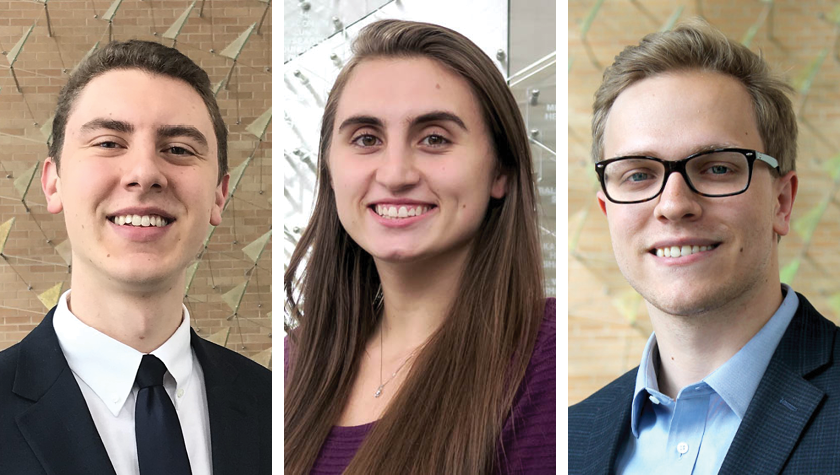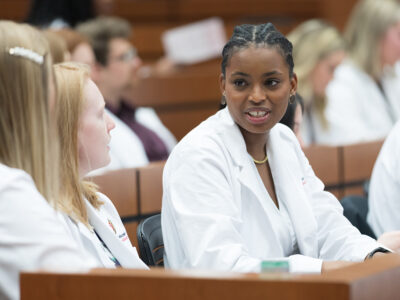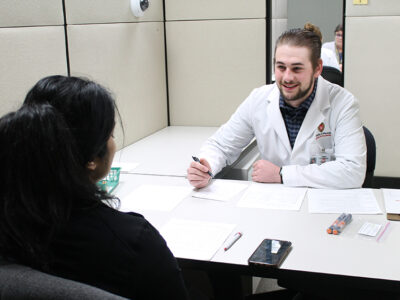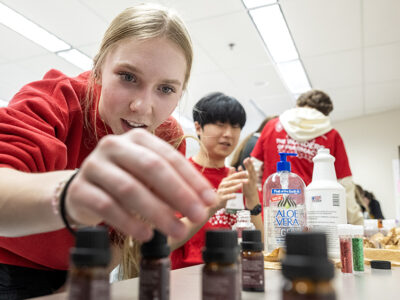
2
December

Fourth-year PharmD students Justin Ferek, Kelsey Brasel, and Thomas Lofy triumph over 107 teams in Clinical Pharmacy Challenge
By Katie Ginder-Vogel
Justin Ferek, Kelsey Brasel, and Thomas Lofy — all fourth-year PharmD students at the University of Wisconsin–Madison School of Pharmacy — were the victors of the 2021 American College of Clinical Pharmacy (ACCP) Clinical Pharmacy Challenge, out of 107 teams representing pharmacy schools around the country.
“Winning felt great because it allowed us to highlight all the effort we three have put into our education during our didactic courses and experiential rotations so far,” says Brasel. “It was also great to showcase the School of Pharmacy, which has provided us a great foundation for our education, with fantastic professors and learning experiences.”
The competition spanned about three weeks in September and October and included a total of seven rounds of competition — eight including a local exam completed in March, which decided which students would represent the School of Pharmacy at the national level.
“Waking up to the congratulations email gave me the feeling that all my hard work has paid off,” says Lofy. “Three years of extensive pharmacy coursework and hundreds of hours working as an intern allowed us to build the knowledge base that put our team in a place to succeed. I think it speaks to all the pharmacists who have impacted my young career, whether that is my mentors, professors, or coworkers.”
Preparing for success
The team, together with alternates Grace Nixon and Nickolas Ruark (both third-year PharmD students), began to prepare for the competition in the early summer by assembling and reviewing current clinical practice guidelines and hand-typed class notes. They met on Zoom throughout the summer and ran through past ACCP Clinical Pharmacy Challenge exams used in the local round of competition.
“Three years of extensive pharmacy coursework and hundreds of hours working as an intern allowed us to build the knowledge base that put our team in a place to succeed.”
—Thomas Lofy
“I think reviewing the exams was important and gave us a competitive edge, due to how quickly you have to make decisions and move through questions,” says Lofy. “On top of group preparation, I was able to use my rotational experiences to reinforce certain topics and identify areas where my prep was lacking.”
The team also spent time discussing their individual strengths and weaknesses and sharing key concepts they had learned from their Advanced Pharmacy Practice Experience (APPE) rotations.
“We had great communication throughout the exams, when reading and discussing difficult questions,” Brasel says. “The three of us have also taken different electives during our didactic years and have been on different APPE rotations so far, which allowed for our team to pull information from a variety of experiences.”
Rising to the top
Each round of competition included three different formats: trivia/lightning, clinical cases, and “Jeopardy”-style questions, which are developed and reviewed by an expert panel of clinical pharmacy practitioners and educators. Competitors knew each round’s format and time limits, and ACCP provided a list of 20 broad topics that cover almost the full spectrum of clinical pharmacy, such as critical care, endocrinology, or rheumatology.
“Each ‘Jeopardy’ round cycled through the 20 subjects in a somewhat predictable fashion, but we otherwise had no idea what subjects we needed to know for the other two sections of the challenge,” says Ferek.
“Generally, we tried to have a well-rounded background with the topics, so we could pick up points regardless of the category,” says Lofy. “As the rounds progressed, we had varying experiences from our rotations, exposing us to different fields of pharmacy. Luckily, that helped build our knowledge base on a wide array of topics.”
For example, if they were dealt an emergency medicine question, they would lean on the teammate who had the most experience — but not every question played to the students’ experience. Lofy says those were some of his favorite questions, as the team had to work together logically to rule out some of the choices.
“Our approach to those challenges was what put us over the top,” he says.
The team started out with scores in the middle of the pack for the first few rounds, but when they found their rhythm, they began to score frequently in the top quartile — or the top spot altogether — in the final rounds.
“Although we all entered the competition with the intent to win, we were so grateful to continue to move onto the next round because it was always unexpected, as there were so many other great teams in the competition,” says Brasel.
Lofy praised his teammates’ levelheadedness throughout the competition, even as the questions increased in difficulty in the last two rounds.
“We stayed steady and were able to narrow in on some of the answers to make educated guesses,” Lofy says. “In the end, that paid off.”
Paving the path forward
The students had different motivations for getting involved with the competition. Ferek represented the UW–Madison School of Pharmacy in ACCP’s 2020 Clinical Pharmacy Challenge as a third-year pharmacy student, and he wanted another chance now that she has more experience.
“I knew that competing as a fourth-year pharmacy student could be a great learning experience and an opportunity to put knowledge to the test,” says Ferek, who has been involved in ACCP’s student organization, the Student College of Clinical Pharmacy (SCCP), since his first year in the PharmD program. “I loved that feeling of confidently selecting an answer, knowing that I wouldn’t have had a clue how to approach the problems one year earlier.”
“Although we all entered the competition with the intent to win, we were so grateful to continue to move onto the next round because it was always unexpected, as there were so many other great teams in the competition.”
—Kelsey Brasel
Lofy says that his natural learning style includes quizzing himself on specific topics while studying.
“I saw this competition as a way to continue learning, while having some fun on the side,” Lofy says. “The spirit of competition gave me some extra motivation to study and improve my skills.”
Brasel, who had planned to complete a PGY-1 acute care pharmacy residency after graduation with the ultimate goal of becoming a clinical inpatient pharmacist, says this experience has strengthened her passion for clinical pharmacy. And Lofy, who plans to pursue a career in hospital pharmacy, says the competition gave him confidence in collaborating with his future colleagues.
“This competition was challenging in a good way and reassured me that I want to be working through complicated problems with a team to provide excellent care for my patients,” he says.
Ferek, too, plans to pursue hospital pharmacy, starting with a residency next year. Proving his skills in this competition has amplified his enthusiasm to take his next step.
“I am confident that developing and utilizing clinical skills for patients’ benefit is exactly what I want to do,” he says. “It has been an immensely satisfying feeling to have our preparation and hard work reach a conclusion.”







